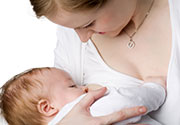And PFASs appear to lower effectiveness of some childhood vaccinations, researchers add
MONDAY, Aug. 24, 2015 (HealthDay News) — New mothers may inadvertently pass industrial chemicals along to their infants through breastfeeding, which might lower the effectiveness of some childhood vaccinations, researchers report. The study was published online Aug. 20 in Environmental Science & Technology.
Philippe Grandjean, M.D., an adjunct professor of environmental health at the Harvard T.H. Chan School of Public Health in Boston, and colleagues followed 81 children who were born in the Faroe Islands, a small country in the North Atlantic, between 1997 and 2000. The investigators looked at levels of five types of perfluorinated alkylate substances (PFASs) in their blood at birth and 11 months, 18 months and 5 years. They also looked at PFAS levels in the mothers of the children at week 32 of pregnancy. PFASs are widely used in consumer products to make them resistant to water, grease, and stains.
The researchers found that children who were exclusively breastfed experienced an increase in PFAS blood concentrations of as much as 30 percent each month, with lower increases among children who were partially breastfed. PFAS levels decreased after breastfeeding stopped.
An earlier study published by Grandjean showed that 7-year-olds with twice the blood concentration of PFASs had about half of the levels of tetanus and diphtheria antibodies as children with average PFAS levels. “We found that for each doubling in exposure to PFASs, the child has an increased risk that the vaccination will not take,” he told HealthDay. “The risk increases between two- and four-fold for each doubling of the child’s exposure.”
Full Text (subscription or payment may be required)
Copyright © 2015 HealthDay. All rights reserved.








